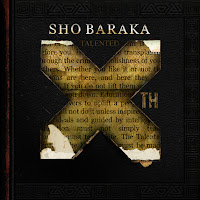Da Truth is back! He has just
released his newest album, Love, Hope
& War. I’ve listened through the whole thing and am hard pressed to
find a song I don’t like! It’s a very well put together album with solid
production and great beats. It stays true to its topic with every song falling
under one of the three title categories, love,
hope or war.
What is interesting and unique about
this album is that it is markedly different from other recent releases in
“Christian” hip hop. Some of my previous posts have been about Christian
rappers that no longer wish their music to be labeled “Christian”. These
rappers, like Lecrae and Sho Baraka prefer that people think of them as rappers
that happen to be Christian rather than “Christian” rappers. Artists like
Lecrae and Sho Baraka have decided to give their music a more evangelistic
thrust. They make music specifically for the unchurched.
Da Truth, on the other hand, takes a
very different approach. He WANTS to be called a Christian rapper. For him,
this title is very essential to who he is, and the music that he makes. Truth
has made no qualms about the fact that his music is specifically for the
church. But is there a place for this in Christian hip hop? From its inception,
Christian rap has been overwhelmingly “street-focused”. It was meant to be an
outreach tool to those hip hop heads that wouldn’t go into church or listen to
a traditional gospel song. Da Truth, however, believes that there’s also a
place for in-reach in Christian hip hop.
So the question is what is the
purpose of Christian music? Is it supposed to be primarily evangelistic, or is
there a place for Christian music made just for Christians? Parenthetically,
pastors are faced with the same dilemma. We are caught between the realm of
shepherd and evangelist. Which is primary? There are voices that would argue
for one over the other and voices that would say they are both equal callings. I
tend to agree with the later. Da Truth cites the Apostle Paul as an example. He
was the missionary of missionaries. He was the “apostle to the Gentiles”. He
helped spread the gospel message from Jerusalem and nearly to Spain. However,
he is also attributed to have written 70% of the New Testament and his letters
were undoubtedly pastoral. He was very much concerned with the well-being of
the churches he established and Christianity as a whole.
With this in mind, I believe one can
be both. I think that Da Truth can make music specifically for the church and
it still have evangelistic components. I think Truth’s stance is also
important. In this day and age it is important for Christians to be vocal about
what they believe and who they are, and I don’t believe that this stance is in
opposition to Lecrae’s. I believe they can coexist. If Lecrae wants to make
music that is more palatable to the secular world and has a more evangelistic
focus then he should be able to do that, but he should not insist that
everybody take that stance. In the same token, if Truth believes his calling is
to directly address the church then so be it! But neither should he enforce
this stance on others. The key idea is Christian freedom. There is room for
both focuses in Christianity and in hip hop. We should be open enough to
embrace both without pitting them against the other.
Shalom



